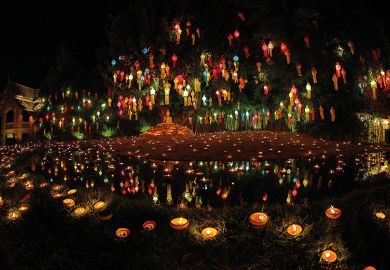I suffered the loneliest years of my life in higher education. As an undergraduate, I struggled in silence through a torturous spiritual crisis. My first years as a graduate student were marked by a dearth of relationships and sad, lonely meals in a tiny studio apartment. My first academic job was spent in a small office above a quiet library reading room.
We know Americans more broadly face a burgeoning crisis of loneliness: a new poll reports that 18 per cent of the population feel they have no one in their lives they can trust. But we’d expect these numbers to plummet on college campuses, where conversation and shared spaces abound. Sadly, however, my experience is typical.
Even before the pandemic, college transitions left many students feeling alone. Loneliness has long been an experience among scholars and early career faculty, too, and doesn’t necessarily get better as careers progress.
Higher education – what I’ve come to call Lonely University – has a fundamental relational problem and doesn’t know how to talk about it. To address this, we must first recognise that hidden struggles and beliefs profoundly impact our intellectual enquiries and discussions.
A metaphor we sometimes use to describe academic discussion is the “Burkean Parlour”. Coined by rhetorician Kenneth Burke, it depicts entering a room where a conversation is in progress. You listen, become familiar with the interlocutors, and await a moment to engage. No one helps you – discovering the hidden rules and assumptions of the conversation is part of the learning process.
You quickly learn that discussion at Lonely U is characterised by parlour decorum: a polite, studied intensity focused on ideas and brooking little to no intrusion from personal business. From my earliest days studying literature in graduate school, I realised that my faith, so richly informing how I read our shared texts, was an embarrassment. The awe I felt handling ancient books was incidental to my enquiry into them. My experiences with loneliness were not something that might enhance a discussion about isolation in King Lear.
This culture runs deep through Lonely U. As the annual Campus Expression Survey conducted by Heterodox Academy reveals, the predominant factor motivating students and faculty to censor themselves is fear of one another, with 62 per cent of sampled students afraid to share their beliefs.
Given this crisis of fellowship, it’s no wonder that we’re also witnessing a renewed call to consider and welcome religious identity in class and on campus. People are craving deeper ways to relate. Moreover, parlour culture’s inability to comprehend how personal belief can inform intellectual life harms enquiry as well as mental health. Had I felt free to discuss my religious faith more openly in graduate school, I’d have articulated the goals of my dissertation more clearly – and most likely found fellow believers with whom to collaborate.
To be clear: the opposite of decorum is not offence, but authenticity. Ample evidence suggests that inviting people to share their full selves on campus integrates well with diversity, teaching and intellectual stimulation. A classroom marked by authentic discussion and curiosity might sometimes forgo nicety, but it also enables deeper exploration and dignifies all learners.
Even simple acknowledgement that religious belief is welcome can help believers stop self-censoring and allow their faith to define their learning. Doing so invites others to bring their own experiences and beliefs to bear on their learning and to connect with others through them.
Research suggests that deeply held belief can improve all learners’ abilities to engage with one another, reducing incidents of polarisation that leave people angry and isolated. Religious belief’s common modes and qualities can be healthy reminders that colleagues are more than their intellectual stances, that human loyalties extend beyond academic units, and that all academic theory has limits. These reminders can be perceived as threats to carefully constructed theorems and social relationships. But they can also stoke the humility and curiosity to ask more about others’ views, recognise our own limits, and forge collaborations on new questions.
For secular schools, the finding that religion strengthens relationships might mean more ample inclusion of religious perspectives in course readings and class conversation, and more collaboration across religious and non-religious student groups. Practices such as these normalise religion, help religious students who find themselves at non-religious schools to feel welcome, and model a commitment to exploring the fullest dimensions of human existence.
Moreover, religious schools can be as prone to culture wars, loneliness and ideological division as secular schools. There, leadership can signal division as an opportunity to ask more about one another and listen, while instructors can openly model how their faith enriches their enquiry and collegiality with fellow scholars, whose beliefs may differ significantly. Indeed, interfaith efforts can provide models for other groups to engage across differences, as well as increase the breadth of questions and research on campus.
During that lonely season in graduate school, my studio apartment happened to be above the offices of a campus faith group. For years I watched a stream of faculty and students – religious and non-religious – enter and get re-energised in real, vulnerable community with each other. The experience ultimately inspired me to find my own faith community, which emboldened my confidence and sharpened my intellectual enquiries.
By contrast, two of the saddest conversations I have had involved rigorous scholars who hid the deep faith that infuses their work with vitally important knowledge. It was our piercing of decorum – our misbehaviour in the parlour – that first allowed us to discuss faith, but their fear persisted and they asked me not to reveal their beliefs (a promise I will keep).
If you work on a college or university campus, someone in your department or classroom is incredibly lonely. As you sit at the fantastic intellectual feast laid out in the Burkean Parlour, forget decorum for a minute. Turn to your fellow with boldness and encouragement, and break bread together.
Kyle Sebastian Vitale is director of programs at Heterodox Academy. He writes about higher education (and Shakespeare when he can!) and taught literature and pedagogy for over a decade at the University of Delaware, Yale University, the University of New Haven and Temple University.
Register to continue
Why register?
- Registration is free and only takes a moment
- Once registered, you can read 3 articles a month
- Sign up for our newsletter
Subscribe
Or subscribe for unlimited access to:
- Unlimited access to news, views, insights & reviews
- Digital editions
- Digital access to THE’s university and college rankings analysis
Already registered or a current subscriber?








